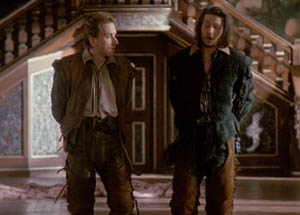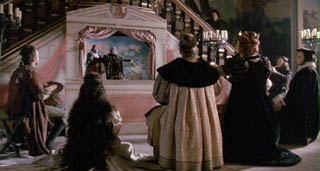|

Yes. Yes, they are. But why did they end up that way? Well, watch the damn movie to find out. I'm not here to provide a synopsis. The directorial debut of (and to date, only film by) acclaimed playwright Tom Stoppard, Rosencrantz and Guildenstern are Dead takes a pair of Hamlet's supporting characters and gives them their own story. The thing being, of course, that the characters don't have any story of their own. They exist merely as adjuncts of another tale, who pop in, do their parts, and disappear once more. What happens to them between scenes? Bewilderment sets in. They have no clear notion of what they are doing, other than that they were summoned to help with Hamlet's affliction, and thus they spend any time not spent in the performance of their normal roles desperately attempting to figure out their places in the world, and for that matter, the world itself. If Hamlet had the wit to present a play within a play, then Rosencrantz and Guildenstern are Dead takes it a few steps further, presenting a play (or teleplay, though it began as a stage play) on the periphery of a play, while the players who performed the original play-within-a-play show up to perform the original play, i.e. Hamlet, for Rosencrantz and Guildenstern during their down time, who have no recognition of what they're being shown, and who seem to have no independent, objective reality. If that sounds somewhat befuddling, it really isn't in the actual viewing. While presenting a lot of existential musings, the film is also quite funny, thanks both to the script and the performances of Gary Oldman and Tim Roth as Rosencrantz and Guildenstern, ostensibly in that order, though who's to say for sure? Certainly not they. The story extrapolates a good deal upon the King and Queen's reversal of the order of their names, leaving the pair questioning even their own identities. Guildenstern is the more intuitive, philosophically-minded of the pair, though Rosencrantz seems forever on the verge of discovering some important truth about physical reality, though unfortunately for the pair, never one which is in any way relevant to their own situation. When not performing their bits from Hamlet or attempting to fathom what they are doing in the story to begin with, the twosome are crossing wits with Richard Dreyfuss as the head of the traveling repertory that has come to perform for the royal court. For all intents and purposes, he represents the voice of the author, as well as being the essence of the concept of performers in general. Very tellingly, Rosencrantz and Guildenstern first arrive at the palace in Denmark after stepping within Dreyfuss' stage-on-wheels, and afterwards debate him at length on the matter of the theatre and its faux reality, particularly in its cavalier attitude towards death. Guildenstern's angry attempt to show what "real death" is provides a point that is at once startling, and then an inexplicable reminder that he hasn't demonstrated anything after all, since his actions are themselves not "real;" they're artificial on two levels. Dreyfuss' player alone seems cognizant of the unreality of the whole affair, and in finally taking on the role of the King of England, a person who remains "offscreen" during the course of Hamlet, he sees to the ultimate fate of our characters, which, if you haven't figured out from the title, was inescapable. 
The film is very self-aware and postmodern in style, a modus operandi that became all the rage in the late '90s, though Stoppard was doing it quite effectively way back in the '60s, making one question just how post-postmodern the idea really is these days. However, unlike more modern attempts at blurring the line between objective reality and narrative reality (makes hacking cough noise, subtley slips in slightly mangled utterance of Last Action Hero, followed by equally strangled "everything Kevin Williamson has ever done," in what would have to be a very long and rambling cough indeed), Rosencrantz and Guildenstern are Dead isn't forever waving its metaphorical arms in the air and shouting at you to please notice its extreme cleverness, with which it has reinvented cinema and for which it should receive copious accolades from the kids. It simply pops on, displays its wit and skill, and politely excuses itself without a lot of self-aggrandizing braggadocio. If you aren't familiar with the plot of Hamlet, you should really familiarize yourself with it first, lest you be left in the dark and miss half the funny bits. The film isn't strictly comedy or parody, though it does contain elements of both. It's mostly an exercise in inventive response to an established work, and if that makes it less of a piece of blockbuster material than films with Vin Diesel or the now-retired Schwartzenegger, I would submit that that is a problem with the bulk of the filmgoing public, and not with this movie. For a first (and only) directorial effort, it's very impressive. -review by Matt Murray
|
|
||||||||